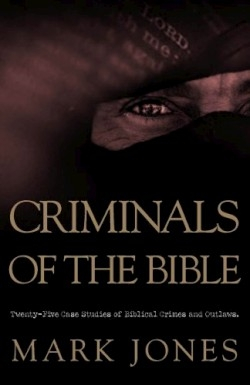Criminals of the Bible
Twenty-Five Case Studies of Biblical Crimes and Outlaws
How could it be that Moses, the man who brought the Ten Commandments down from Mount Sinai, committed the crimes of homicide, concealing a homicide, and fleeing from justice? Moses, as the author points out, is one more case of many Biblical heroes’ capacity for wrongdoing. This book is an illuminating study of some of the Good Book’s most significant transgressions. Jones includes such infamous evildoers as Cain, Jezebel, and the highwaymen who robbed the Good Samaritan, yet he also brings in such Old Testament icons as Moses and David. In addition, he profiles the cases of some, like John the Baptist and Jesus Christ, who were falsely accused or who broke an unjust law or one superseded by God’s law.
Jones’s exposition is enriched by his research of Biblical scholarship and by his expertise as a professor of criminal justice at East Carolina University. His previous books include Criminal Justice Pioneers in U.S. History and Community Corrections.
Each of Jones’s cases follows roughly the same format. They begin with a quote from Scripture, which may run from a few lines to two pages, followed by background information on the principal characters. Queen Jezebel chastises King Ahab for his inability to terrorize his subjects (“Is this how you act as King over Israel?”), then forces two men to testify that a landowner named Naboth has disavowed God and the King. This results in the stoning of Naboth, which allows Ahab to seize his land. Jones delves into the background for Jezebel’s reputation among modern Christians as a Lady Macbeth-like figure.
A section called “the crime” interprets the text with respect to alleged or actual wrongdoings, often defining criminal terms and referring to Mosaic Law. A “modern view” section takes the wrongdoing into the present. In the chapter exploring Jezebel’s crime, Jones refers to the Monica Lewinsky scandal and the O.J. Simpson trial, and quotes Samuel Johnson and Harvard philosopher Sissela Bok.
The author ends each case with a “lessons” section, in which he suggests implications of the reading for Christians today. Often, the most important lesson cited is God’s forgiveness (“There is no sin that is unforgivable”), but he generally foregoes preaching, instead using common sense and story examples to make his points. Jezebel’s and Ahab’s lessons include the ninth and tenth Commandments, the dangers of unchecked political power, the danger of (like Jezebel) “satisfying our own ego needs,” and some insights into the factor of “acceptance of responsibility” in judges’ sentencing guidelines today.
The message? “Every life contains lessons for others.” He shows that Biblical characters are not unlike people today, and that everyone is capable of error. Even Moses, who led the Israelites to the Promised Land and who is a symbol of Christian morality, was at first a murderer and fugitive from the law.
Reviewed by
Joe Taylor
Disclosure: This article is not an endorsement, but a review. The publisher of this book provided free copies of the book to have their book reviewed by a professional reviewer. No fee was paid by the publisher for this review. Foreword Reviews only recommends books that we love. Foreword Magazine, Inc. is disclosing this in accordance with the Federal Trade Commission’s 16 CFR, Part 255.

